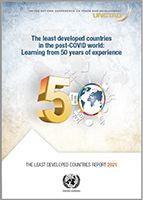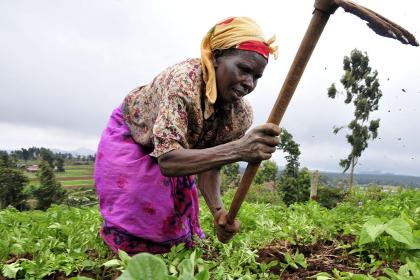
Over the last 50 years most least developed countries (LDCs) have struggled to overcome the development challenges that led to the establishment of the category in 1971. Even their strong economic growth since the mid-1990s has generally been insufficient to redress their long-term income divergence with the rest of the world. The COVID-19 crisis and the emerging two-speed global recovery threaten to reverse many hard-won development gains, which is further aggravated by the creeping adverse effects of climate change.
Mainstreaming productive capacities development in these countries is a necessary condition for boosting their capacity to respond to and recover from crises. While LDCs prioritize economic transformation and diversification in their policies, they have critically lacked the means necessary to progress towards the objectives of the 2030 Agenda for Sustainable Development. The average annual investment requirements to end extreme poverty (SDG 1.1) in LDCs is estimated at $485 billion, whereas doubling the share of manufacturing in GDP (SDG 9.2) is estimated at $1,051 billion. The latter amounts to more than triple the current investment by LDCs, and therefore vastly exceeds LDCs’ available resources.
The international community has therefore an essential role to play in supporting LDCs in their efforts to mobilize adequate resources for their sustainable development needs, including in financing and technology. A new generation of international support measures that are more closely aligned to the expressed needs of LDCs and 21st century realities will have to be rolled out to support their domestic efforts. Bolstering multilateralism and dealing decisively with external sources of instability affecting LDCs is necessary to create a conducive climate for the achievement of the next programme of action for the least developed countries for the decade 2022-2031.
The COVID-19 pandemic has exposed and amplified the vulnerability of least developed countries to external shocks. Once again, those with the least are suffering the most. At a time fraught with fragilities, UNCTAD’s Least Developed Countries Report shines a light on how governments and the international community can pool efforts to build productive capacities as a pathway to sustainable development for all.
António Guterres
Secretary-General of the United Nations
Since advocating for the creation of the category of the least developed countries (LDCs) five decades ago, UNCTAD has been at the forefront of LDC development policy. Today, UNCTAD leads the analysis and search for practical national solutions for LDCs, rallying the international community to provide strengthened and appropriate support at the global level. This report proposes a pivotal agenda for the 2022-2031 decade for LDCs, a crucial time period that is flanked on one end by the COVID-19 pandemic and on the other by the culmination of the 2030 Agenda. Centred on building productive capacities for their programme of action, this report embodies UNCTAD’s unique expertise and continued commitment to help LDCs transition to a more inclusive, prosperous and sustainable future for both their citizens and the global community.
Rebeca Grynspan
Secretary-General of UNCTAD
This is a game-changing report: it is unusual for a mainstream organization such as UNCTAD to examine the results of economic policies on the ground, challenge the ineffectiveness of the dominant economic discourse, and recommend radically new course of action. The least developed countries deserved such a hard look. After half a century of underperformance due to erroneous strategies, their plight is being felt around the world as a threat to global peace. This report sheds a vivid light on past mistakes and articulates a pragmatic agenda for building productive capacity in LDC, boosting global aggregate demand, and achieving shared prosperity.
Professor Célestin Monga
Harvard John F. Kennedy School of Government




